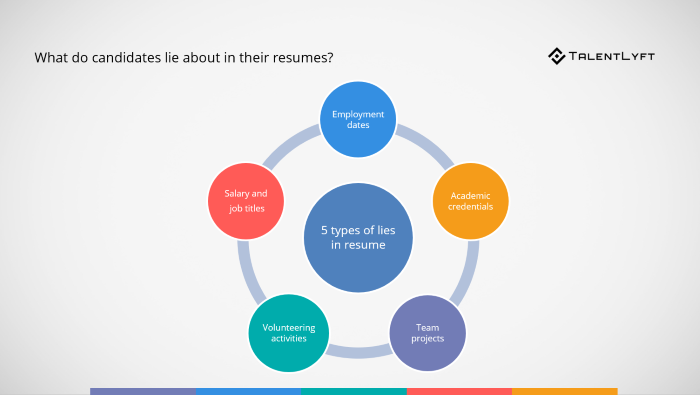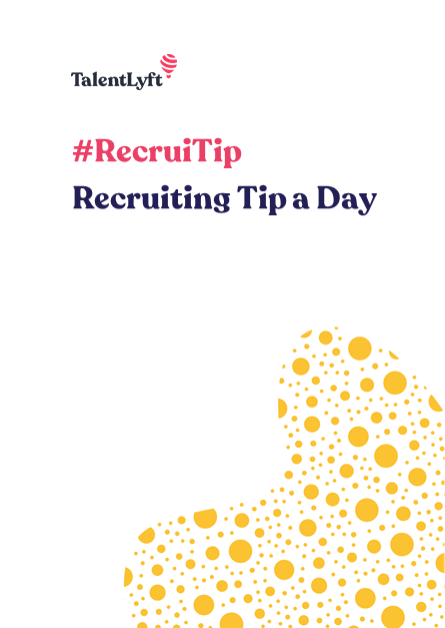![Boolean Search for Recruiters [Actionable Guide]](https://adoptoprod.blob.core.windows.net/article/7wyu_xAg806Tm_lmFg71Rw.png)
Did you know that 85% of employers caught job candidates lying in their resume? How about you? Can you recognize a lie? In this blog post, you will learn a 5-step strategy successful recruiters use to make sure a candidate’s resume is truthful.
Did you know that 85% of employers caught job candidates lying in their resume? How about you? Can you recognize a lie? In this blog post, you will learn a 5-step strategy successful recruiters use to make sure a candidate’s resume is truthful.
It’s not easy to be a hiring manager. Finding and hiring ideal job candidates is a very demanding job.
You have to evaluate different personalities to narrow down the list of candidates. Some of those personalities are fake, and that adds another layer of complexity to your job.
You have to be very careful to make sure you’re hiring not the person who looks right, but the person who is right for the specific position.
In order to do that, you have to be able to spot a lie in candidates resumes.
If you use the keywords “lie on resume” to search Google, the search engine will launch one of the most common questions it gets: Is it a crime to lie on a resume?
The answer is interesting, to say the least:
“According to law, falsifying information on a resume is not illegal unless you’re lying about your educational credentials.”
The resume is not a legal document, so the candidates are not legally obliged to tell the truth and nothing but the truth.
We’ll give you another piece of information that surprises HR managers:
HireRight’s 2017 Employment Screening Benchmark Report found that 85% of employers caught job candidates lying on their resumes.
It’s tough to get a job in such a competitive market.
Recent graduates and people with gaps in their hiring history, in particular, have a really hard time to compete.
To gain the upper hand, they lie. It’s a fact. It’s not the right thing to do, but they are doing it.
As a hiring manager, it is your responsibility to make sure all information in a candidate’s resume is true before you hire them.
We’ll tell you how to do that.
Here is a 5-step approach that successful recruiters use to check if the candidate’s resume is truthful:
Before you can start identifying lies in resumes, you should be aware of the most common type of information that job candidates tend to fabricate:

If you offer a position in your marketing team and you ask for basic programming skills, many candidates will lie about having those skills.
Whenever you’re after a specific set of skills, you can rely on tests or quizzes early in the hiring process, so you’ll eliminate the candidates who lied about that part.
Jane Paulins, a career advisor at EssayGeeks.co.uk, gives HR managers a recommendation:
“Job candidates are often trying to disguise their lack of experience with lies they consider innocent. Since you cannot interview everyone at the beginning of the hiring process and you don’t want to let deceiving resumes go forward, it’s smart to create a simple quiz or test that the candidates should take when submitting their online application.”
When crafting the content for the job posting, include a requirement for a transcript or graduation confirmation to be included in the application documents. That’s a good way to make sure you’re getting applications from relevant candidates.
Unfortunately, it is also one of the top causes of a bad candidate experience.
It is better to avoid including such requirements in order to make the application process as simple as possible.
In that case, you should definitely call the universities to make sure your narrow list of candidates you’re interviewing does not include any liars.
If someone includes an impressive list of certificates in their resume, call the institutions that provided them to make sure you’re not dealing with a fabrication.
You surely check the LinkedIn profiles of prospective candidates, but what about their social media profiles?
If someone lied about being at Harvard when they went to a different university, their Facebook profile might reveal the lie.
If someone mentioned their influential online presence, you must check all platforms to make sure the candidate is not inflating their authority.
Social networks are great because they allow you to dig deeper.
One candidate may claim to be a socially-responsible person who takes part in all sorts of volunteering activities, but you’ll find out they made racist or body-shaming comments if you dig through their Facebook, Twitter, and Instagram activity.
“So you studied at Harvard, right? Who was your professor of Law?”
This is a simple question that can reveal a big lie.
If the dates in the job history look shady, you can ask a specific interview question around that aspect.
Ask for examples of their experience, so the candidates can prove how exactly they achieved the success they claim to have achieved.
When asking these questions, make sure you carefully observe candidates body language.
Chris Richardson is a journalist, editor, and a blogger. He loves to write, learn new things, and meet new outgoing people. Chris is also fond of traveling, sports, and playing the guitar. Follow him on Google+.












